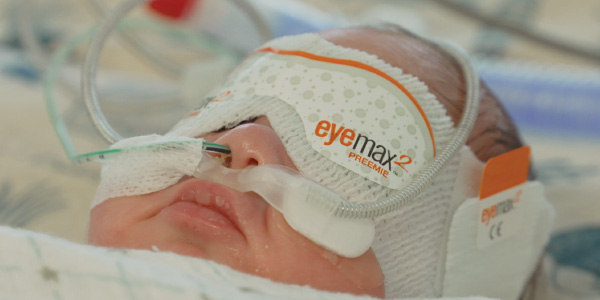
We can all appreciate the benefits of a good night’s sleep, but for premature babies that can be hard to achieve.
Their body clocks are not properly developed, potentially leading to a host of physical and developmental problems. A simple set of eye masks and ear plugs – an inexpensive solution explored in a successful pilot study by The Kids Research Institute Australia, together with the Child and Adolescent Health Service – could hold the key to better outcomes for our tiniest bubs. Now, a nationwide clinical trial is testing the idea in hundreds of premmies across the country.
The Neonatal Intensive Care Unit (NICU) at King Edward Memorial Hospital is a busy place. Dozens of cribs and incubators display the names of the tiny newborns nestled inside. Parents hover over their precious babies as machines beep and whirr, monitoring heartbeat, breathing and feeding.
When night-time rolls around, some of these bubs will be fitted with specially made mini-eye masks and ear plugs designed to teach them the difference between day and night.
They are part of the CIRCA DIEM trial, led by The Kids Research Institute Australia and University of Western Australia Professor Jane Pillow, who is driving the recruitment of almost 1,000 pre-term babies (born at less than 31 weeks’ gestation) in hospitals all over Australia, to see if the simple intervention can kickstart the babies’ body clocks.
“Circadian rhythms are vital for healthy development,” Professor Pillow said.
“They’re present in most cells and drive up to 20 per cent of the genes in your body, so they actually control many developmental processes.”
Babies typically develop their circadian rhythms – or body clocks – in the womb in the third trimester of pregnancy, but those who are born prematurely don’t get the opportunity to learn this vital biological process from their mother.
Circadian rhythms in early life may have a significant impact on the baby’s development. From fighting infections to boosting brain and organ development. They are even thought to play a role in heart disease, behavioural problems and obesity.
Premature babies are also up to seven times more likely to develop autism than those born at full term, and researchers think the sleep-wake cycles developed in the third trimester of pregnancy could play a crucial role.
“Preterm babies are born before that intrinsic rhythm has developed, when they’re still reliant on the mother’s time-of-day signals – and then suddenly the mum’s not there any more,” Professor Pillow said.
“Some of these babies are then in a noisy hospital environment with constant dim lighting for 3–5 months – and we know from recent studies that they don’t develop a circadian rhythm before they go home.
“That’s a concern, because experimental studies suggest that circadian rhythms are important for healthy growth and development, and it may be that the brain and other vital organs of premature babies are not receiving all the right signals for normal development while they are in hospital.”
The CIRCA DIEM trial began as a small pilot study at King Edward Memorial Hospital in 2019 and, following promising results, went nationwide in 2022 – rolling out to NICUs in Western Australia, Victoria and New South Wales. Half of the babies recruited to the trial will receive the intervention, while the other half – the control group – will receive routine care.
“The beauty of this trial is that it’s so simple,” Professor Pillow said.
“The masks and plugs cost around $66 per child over an 8-12 week period, which makes it extremely affordable, and they are extremely comfortable for the babies to wear.”
